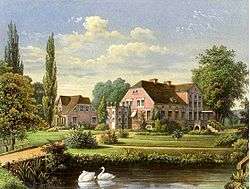Podągi
Podągi [pɔˈdɔnɡi] (German: Podangen) is a village in the administrative district of Gmina Godkowo, within Elbląg County, Warmian-Masurian Voivodeship, in northern Poland.[1]
Podągi Podangen | |
|---|---|
Village | |
 Podangen Palace, around 1860, Edition by Alexander Duncker | |
 Podągi Location in Poland | |
| Coordinates: 54°04′54″N 20°02′10″E | |
| Country | |
| Voivodeship | Warmian-Masurian |
| County | Elbląg County |
| Gmina | Godkowo |
Before 1945 the area was part of Germany (East Prussia). After World War II the region was placed under Polish administration by the Potsdam Agreement under territorial changes demanded by the Soviet Union. Most Germans fled or were expelled and replaced with Poles expelled from the Polish areas annexed by the Soviet Union or Ukrainians forced to settle in the area through Operation Vistula in 1947.
Notable people
- August von Kanitz (1783-1852), Prussian General
- Hans von Kanitz (1841–1913), Politician
- Gerhard von Kanitz (1885–1949), Politician
gollark: > branch free> `if (fabsf(s1)>1) {`
gollark: Or Brain[REDACTED].
gollark: I think the most portable interpreted language by now is *probably* WebAssembly or JS?
gollark: You can make a C interpreter if you want to.
gollark: It can be ish via WASM.
References
This article is issued from Wikipedia. The text is licensed under Creative Commons - Attribution - Sharealike. Additional terms may apply for the media files.